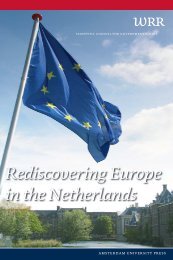The Western Condition - St Antony's College - University of Oxford
The Western Condition - St Antony's College - University of Oxford
The Western Condition - St Antony's College - University of Oxford
You also want an ePaper? Increase the reach of your titles
YUMPU automatically turns print PDFs into web optimized ePapers that Google loves.
Faces <strong>of</strong> the West: Can Europeanisation, Americanisation and Autonomisation be reconciled?<br />
However, for it to go beyond expressions <strong>of</strong> goodwill, the initiative requires the continuous<br />
interest and the active support <strong>of</strong> civil society in Europe and Turkey. Civil society organisations<br />
can play an instrumental role in sustaining pressure on European and Turkish <strong>of</strong>ficials to stick to<br />
the commitments outlined in the Positive Agenda, and in informing their respective publics on a<br />
range <strong>of</strong> issues where mainstream views can be susceptible to populist misrepresentation. It is up<br />
to Turkish civil society, for example, to make the case to the public-at-large that EU engagement<br />
does not only provide a framework for economic reform, for which little interest remains in<br />
Turkey given the state <strong>of</strong> European economies, but also much needed impetus for political<br />
reform at a time when fundamental freedoms and civil liberties are under increasing<br />
governmental pressure. Such efforts will also have to contend with the popular image <strong>of</strong> a crisisridden<br />
Europe failing to live up to its own democratic standards, as technocratic governments<br />
from Spain to Greece are made to follow externally designed blueprints for scaling down public<br />
services at the expense <strong>of</strong> the majority <strong>of</strong> their populations.<br />
Another issue where increased cooperation is both vital and possible, but also prone to popular<br />
resistance from within Europe is the issue <strong>of</strong> mobility and migration. <strong>The</strong> stringent visa restrictions<br />
facing Turkish citizens wishing to travel to the 26-nation Schengen zone has long been a cause for<br />
intense and widespread frustration within Turkey. At a time when Turkish citizens possess greater<br />
financial means than ever to travel abroad for leisure or business, and while the number <strong>of</strong> non-<br />
Schengen countries they can visit without obtaining a visa is continually growing, the doors <strong>of</strong><br />
Europe remain shut to many. Visa applications processes to many EU countries from Turkey are<br />
bureaucratically complicated, slow moving and expensive, resulting in a loss <strong>of</strong> valuable business<br />
potential for Europe and perceptions <strong>of</strong> discrimination and double standards among Turkish<br />
citizens. 176 In this respect, the agreement reached between the two sides in June 2012 to take steps<br />
towards “a visa-free regime between the EU and Turkey as a gradual and long-term goal” in<br />
exchange for increased commitment by the Turkish government to stem the flow <strong>of</strong> third-country<br />
migrants from Turkey into Europe is a significant development. As part <strong>of</strong> a readmission<br />
agreement that is expected to be ratified by both sides in 2013, illegal migrants who reach Europe<br />
via Turkey will be repatriated to their home countries following temporary stays in Turkey. Turkey<br />
will establish camps in anticipation <strong>of</strong> temporarily accommodating as many as 100,000 returning<br />
migrants, whose financial burden will be shared with the EU. 177<br />
<strong>The</strong> logistical complication and the humanitarian controversy <strong>of</strong> the repatriation process<br />
notwithstanding, the deal risks being still-born due to the insistence <strong>of</strong> Germany, Netherlands<br />
176 “Turkey is the only EU candidate country without a visa-free travel regime with the EU. Even Moldova and<br />
Ukraine, which have yet to receive any promise <strong>of</strong> membership, participate in an EU visa liberalisation process.<br />
Other eastern neighbours are expected to follow suit. <strong>The</strong>re are even discussions about visa-free travel for<br />
Russians.” Gerald Knaus and Alexandra <strong>St</strong>iglmayer, ‘Being fair to Turkey is in the EU's interest’, Euobserver, 12<br />
March 2012.<br />
177 ‘Turkey, EU formally start process for visa liberalization’, Today’s Zaman, 21 June 2012.<br />
66

















